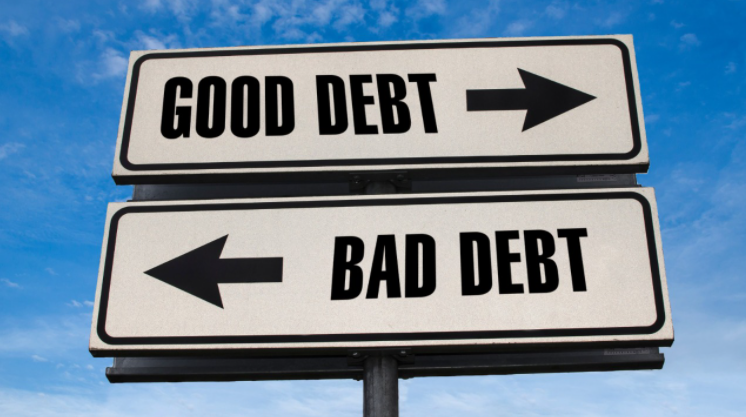
Good Debt vs. Bad Debt
Many of us rely on debt, short-term or long-term, to purchase things we need or want.
We often think of debt as bad. We believe we should avoid debt at all costs. However, we can’t always avoid debt. When managed well, debt can be helpful.
If we take on good debt, it can help us make our financial lives better. However, in other cases, debt can be bad and detrimental to our finances.
It is important to understand the difference between good debt and bad debt because it can help us make better financial decisions. When we take on debt that is good for us and avoid debt that will hurt our finances, we are in a position to live a financially healthy life.
What is Good Debt?

Generally, good debt is debt used to buy something that increases in value.
If you take out debt to invest or create an income, that might be good debt.
You might take on debt to take on a new opportunity or to make an investment. This is typically considered good debt.
Many of us rely on debt to buy homes or to be able to go to school. We take on the risk of debt because it will help in the long run.
Types of “good debt”
Mortgages
Most people rely on a mortgage to buy homes. Mortgage loans allow us to buy a house without having the cash upfront. Every month, when you make mortgage payments, you pay down a little bit of the principal along with interest. This lets you build equity in your home and is a form of investment.
However, keep in mind that even though mortgages are considered good debt, it is still important to borrow responsibly. It is best not to overextend yourself by taking on too much debt and make your monthly payments on time, in full.
Student Loans
For many, student loans are a form of good debt. Typically, you take on student loans to study and increase your income potential. If you can use your education to get a higher-paying job or build a better career, your student loans will pay off. It is vital to limit the amount you borrow because it is possible for the job market to turn at any time.
What is Bad Debt?

Bad debt is typically debt used to purchase things to consume. These are things that don’t generally go up in value.
Bad debt does not provide a return but instead costs you in excess fees and interest. You might take out debt to buy something that depreciates over the long run.
Types of bad debt
Credit Card Debt
Credit cards would rank at the top of the list for bad debt. Most of us use our credit cards to purchase consumables or day-to-day expenses. We often put everyday items on our credit cards, such as entertainment, clothes, and restaurant meals. Credit cards can be expensive with incredibly high interest rates when you don’t pay them off in full right away. The things you buy on your credit cards will not go up in value, and the fees will end up costing you more in the long run.
High-interest loans
Loans like payday loans with high fees and interest rates are bad debt. These loans are only a short-term fix and rarely provide value over the long run. Payday loans are expensive and difficult to pay back if you’re in a cycle of debt. They can be bad for your credit score and your finances.
Is a car loan considered good or bad debt?
Car loans can be a grey area of debt. They lose their value as soon as you drive them off the lot. That would put a car loan in the bad debt category. However, a vehicle may be essential for you to travel to work and earn money.
It is critical to evaluate whether a car loan is suitable for your situation. Choosing a car in a sensible price range, with a reasonable interest rate and a car payment you can afford, can make a car loan good debt for you.
How to Stay Out of Bad Debt?
We are told to avoid debt at all costs. However, it is possible to take on debt when you manage it well.
If you consider taking on debt, the best thing you can do is understand whether the new debt will be good or bad for your circumstances.
These guidelines can help you make an informed decision regarding debt.
Can you afford the payments?
Debt is never free. It comes with interest costs, fees and penalties. These expenses can be costly, especially if you cannot afford the debt you take on. If you are not able to save money every month or live paycheck to paycheck, new debt may not be the most prudent decision for your finances.
Will the debt provide a return?
Another question to ask yourself is what you are buying with the debt. Will the purchase provide a positive return?
For example, when you take on student loans, your goal is to find a job with higher income potential. If that pans out, your student loan debt helped create a better financial life for you and your family.
What are your risks?
Before taking on any debt, it is essential to evaluate the risks of the debt.
Maybe your home doesn’t go up in value. Or the field of your study for student loans is no longer in demand. Unexpected changes can happen in life and the world around us. It is important to prepare for them.
For example, what happens if you lose your job? Do you have an emergency fund in case of unexpected life events?
It is vital to build yourself a cushion when considering taking on more debt so that you are not stuck with the consequences of unpaid debt.
Can you avoid the debt?
While debt can be good in some situations, all debt comes with risk. If you don’t take on debt, you can avoid the burden of interest and stress that might accompany the obligation of debt.
Debt is different for everyone.
While we can categorize many types of loans as good debt or bad debt, any decision you make to take on debt should consider your financial circumstances.
What might be good debt for someone can quickly become a financial burden for you if you cannot afford to take on the debt.
If you are struggling with the debt you owe and need help navigating, and paying down your debt, debt experts at EmpireOne Credit are here to help.
We offer credit counselling services to help you find the best way to get out of debt. Contact us for a free consultation.





